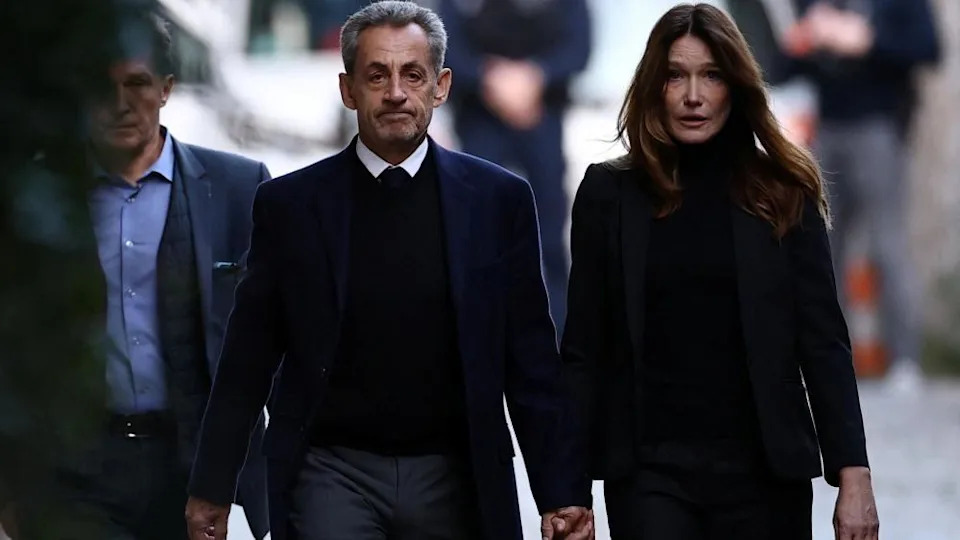World
Sarkozy Begins Five-Year Prison Sentence for Campaign Finance Conspiracy

Nicolas Sarkozy has become the first former French president to be incarcerated, beginning a five-year prison sentence for conspiracy related to campaign financing. This historic sentencing arises from allegations that Sarkozy’s 2007 presidential campaign was funded by illicit payments from the late Libyan dictator Muammar Gaddafi. The last time a French leader faced imprisonment was in 1945, when Philippe Pétain, the collaborationist chief during World War Two, was sentenced for treason.
Sarkozy, who served as president from 2007 to 2012, arrived at La Santé prison in Paris at 09:40 (07:40 GMT) under heavy security. He is currently housed in the isolation wing, occupying a cell approximately 9 square meters (95 square feet) in size. As he entered the prison, Sarkozy maintained his innocence in the case, taking to social media to express his defiance. “I have no doubt. Truth will prevail,” he stated, adding that he feels sorrow for a France “humiliated by a will for revenge.”
Supporters gathered outside his residence in the affluent 16th district of Paris, where his son Louis called for a show of solidarity. Another son, Pierre, requested messages of love rather than political statements, highlighting the family’s desire for support amid the controversy.
Despite the serious charges against him, Sarkozy has insisted he does not want special treatment while serving his sentence. For his safety, however, he remains in isolation due to the nature of other inmates, many of whom are convicted of serious crimes. He will have access to basic amenities, including a toilet, shower, desk, and a small television, and will be allowed one hour of exercise each day.
Prior to his imprisonment, Sarkozy met with current President Emmanuel Macron at the Élysée Palace. Macron acknowledged the gravity of the situation, stating, “It was normal that on a human level I should receive one of my predecessors in that context.” Additionally, Justice Minister Gérald Darmanin announced plans to visit Sarkozy in prison to ensure his safety and monitor the facility’s operations, expressing empathy for the former president’s distress.
Sarkozy’s case involves allegations that millions of euros from Libya were funneled into his campaign. While he was cleared of directly receiving these funds, he was convicted of criminal association with former aides Brice Hortefeux and Claude Guéant, who engaged in secret financing discussions with Gaddafi’s intelligence chief in 2005. The intermediary, Ziad Tiakeddine, who facilitated these meetings, died shortly before Sarkozy’s conviction.
As he awaits the outcome of his appeal, Sarkozy’s legal team has described him as innocent, despite the court’s findings labeling the charges as “exceptionally serious.” Reflecting on his upcoming prison life, Sarkozy indicated that he would take two books with him: a biography of Jesus and Alexandre Dumas’ classic, “The Count of Monte Cristo,” which tells the story of a man wrongfully imprisoned who seeks vengeance.
This situation marks a significant moment in French political history, sparking debate about accountability and justice for public figures. While Sarkozy faces personal challenges, the implications of this case resonate widely within the political landscape of France.
-

 Lifestyle5 months ago
Lifestyle5 months agoLibraries Challenge Rising E-Book Costs Amid Growing Demand
-

 Sports4 months ago
Sports4 months agoTyreek Hill Responds to Tua Tagovailoa’s Comments on Team Dynamics
-

 Sports4 months ago
Sports4 months agoLiverpool Secures Agreement to Sign Young Striker Will Wright
-

 Lifestyle4 months ago
Lifestyle4 months agoSave Your Split Tomatoes: Expert Tips for Gardeners
-

 Lifestyle4 months ago
Lifestyle4 months agoPrincess Beatrice’s Daughter Athena Joins Siblings at London Parade
-

 Science4 months ago
Science4 months agoSan Francisco Hosts Unique Contest to Identify “Performative Males”
-

 World4 months ago
World4 months agoWinter Storms Lash New South Wales with Snow, Flood Risks
-

 Science5 months ago
Science5 months agoTrump Administration Moves to Repeal Key Climate Regulation
-

 Business5 months ago
Business5 months agoSoFi Technologies Shares Slip 2% Following Insider Stock Sale
-

 Science5 months ago
Science5 months agoNew Tool Reveals Link Between Horse Coat Condition and Parasites
-

 Sports4 months ago
Sports4 months agoElon Musk Sculpture Travels From Utah to Yosemite National Park
-

 Science5 months ago
Science5 months agoNew Study Confirms Humans Transported Stonehenge Bluestones









